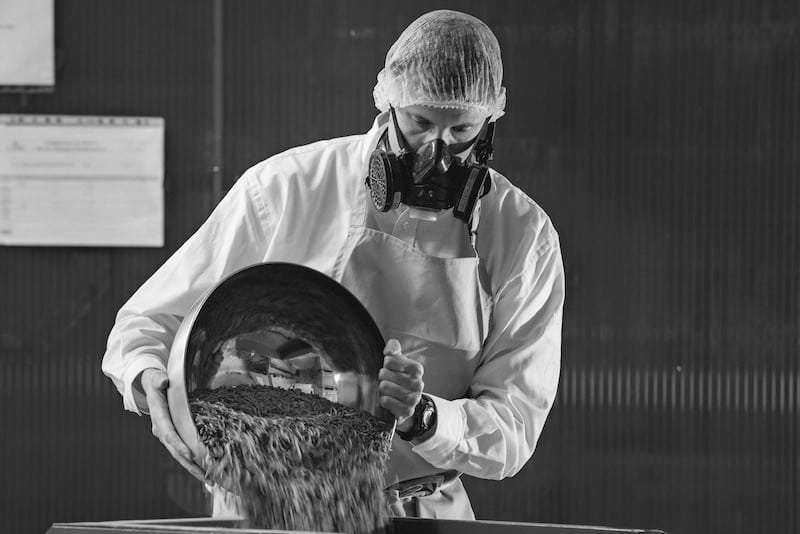Europe is seeing a surge of interest in edible insect farming after an EU vote earlier this month greenlit the first insect-derived food product for human consumption. But insect protein pioneers still face other obstacles such as restrictions on what insects can be fed.
The approval went to dried yellow mealworm developed by French-based biotech Agronutris, which can be consumed as a whole snack or as an ingredient in biscuits, smoothies, or pasta products. The EU’s move follows record investment in meat and dairy alternatives over the past year, as demand grows for more sustainable forms of dietary protein.
Insects offer the potential for a high-quality food source grown with fewer resource requirements than traditional methods; while mealworms consume similar energy levels as pigs to make a kilo of protein, they produce between 10 and 100 times less greenhouse gases and require far less farmland or water.
The industry may need to deal with the ‘yuck factor’ of eating insects in the European markets. However, predictions suggest the number of Europeans consuming edible insects will soar from nine million in 2019 to 390 million by 2030, joining nearly two billion others who eat them across the globe.
“The EU approval of the yellow mealworm as a novel food was a huge step forward for the industry,” says Eric Archambeau, co-founder and Partner at agri-food tech investor firm Astanor Ventures.
“It shows the superior nutritional value of the mealworm and opens the doors towards further approvals. The approval only concerns the whole insect at the moment, but it paves the way for approval of more products such as defatted insect protein, which represents a huge market for insect-derived products.”
The EU draft legal act to authorize yellow mealworm for human consumption was voted on by its 27 member states, following a favorable scientific opinion by the European Food Safety Authority (EFSA) in January. Once the European Commission has adopted the text formally – likely by the end of June – Agronutris will hold exclusive commercialization rights for the larvae for five years.
“The insect-based products will be interesting for athletes, flexitarians, and the older population,” said Agronutris’ co-founder Cédric Auriol.
“Those three markets are interesting since they are looking for qualitative and sustainable proteins, which insects can offer.”
Other companies and organizations are closing in behind Agronutris, with more than 20 EU novel food applications for edible insect products submitted so far to the EFSA. One of the most prominent is the French firm Ynsect, which has applied for an EFSA decision on a defatted insect protein powder. The company closed a colossal Series C round at €304M last October and took over the Dutch mealworm manufacturer Protifarm last month.
Dutch insect breeder Fair Insects, which was acquired by insect-based manufacturer Protix in 2017, is looking to market both house crickets and locusts as an ingredient for consumables such as cereals, ready meals, and alcoholic beverages. The company points out that both insects are easily farmed, have short life cycles, and contain high levels of omega-3 fatty acids.
The Belgian Insect Industry Federation has applied to sell heat-treated migratory locust nymphs or adults for use in savory sandwich spreads, sauces, confectionery and salads, among other food types.
Meanwhile, the Finnish beekeepers’ association is pinning its hopes on commercializing protein-rich ingredients made from male honeybee larvae. The association points out in its EFSA application that males are removed from the hive in many countries to control mites, and they therefore represent a byproduct of beekeeping and honey production while having a high nutritional value themselves.

Edible insect products are already available in some EU member states. This is because they were on sale before the EU included insect-based foods in its latest Novel Food Regulation in 2018, which introduced a requirement for pre-market authorizations.
Countries have adopted different approaches to transitional measures that allowed companies in this position to continue to sell their products while their market authorization is decided upon, resulting in patchwork enforcement of the legislation.
While Germany and Austria have applied the transitional measure only to whole insects but not derivatives, others such as Sweden and Finland have applied it to both forms of insect products. Spain and Portugal, by contrast, have not applied the transitional measure or only applied it restrictively.
The industry remains in its nascent stage overall, according to a survey last year by an EU non-profit lobbying group known as the International Platform of Insects for Food and Feed. Four fifths of the 33 European companies developing edible insect products surveyed had less than 10 employees. Nearly two thirds had a total investment of less than half a million euros.
While the latest EU decision will be important to growing the sector, some experts believe the greatest growth may not lie with human consumption but with animal feed.
“In Europe today, insects are more a novelty food than a fast-growing food category,” maintained Peter Nieuwenhuizen, co-founder of the European Circular Bioeconomy Fund (ECBF).
“The more interesting area from a commercial and sustainability perspective is for farmed animals as well as pets, where insects reared on byproducts and waste materials could bring big benefits.”
Nieuwenhuizen pointed out that insects fed on brewing and potato-processing byproducts such as skins can already be used in pet food and fish farming. However, feeding insects on huge food waste streams such as from certain supermarket and catering waste is currently not permitted. Nieuwenhuizen sees the lifting of these restrictions on the horizon.
The use of insects in animal feed has already reached the mainstream, with Nestle launching a Swiss version of its Purina pet food in November that included protein from black soldier fly larvae.
Thomas Farrugia, CEO and founder of UK black soldier fly breeder Betabugs, also considers animal fodder an important growth area for the industry.
“Approval of insects for human consumption by the EU means that increasing amounts of consumers will become aware of the opportunities provided by the insect protein market — not just for direct human consumption, but also as an alternative to currently utilized protein sources within animal feed, such as soya,” he told me.
“This will fast-track the demand for insect protein, accelerating our sector’s growth.”
Cover image from Elena Resko. Body text image from Agronutris.





